Idle Notes on John Carpenter
A tall, gaunt, gorgeous goth gal was over to the house way back when Prince of Darkness was first released, & we'd both been to see it on different days. I had a very mild starter-crush on her partly because her long black duster was such a sexy coat, but I didn't know her well enough to be sure she was even a dyke.
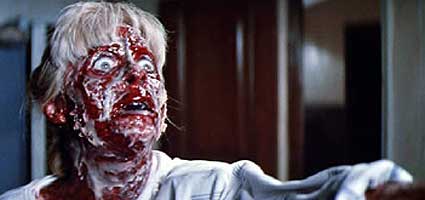 Unfortunately I made the mistake of mentioning I'd just been to see a really bad, bad film, Prince of Darkness directed by John Carpenter. Unfortunately I made the mistake of mentioning I'd just been to see a really bad, bad film, Prince of Darkness directed by John Carpenter.
My visitor gave me a look of hatred & informed me that the true dark secrets of the universe were in that film, that it was the most profound experience she had ever had in any theater, & I could just go to hell.
She stormed out & for the next couple of weeks began harrassing me by calling in the wee hours & leaving angry messages if I refused to answer the phone. I asked the person who introduced me to her why he hadn't warned me she's a dangerous nut, but he shrugged & said he thought I liked dangerous nuts.
Prince of Darkness had some good ideas with the mystical bits, a wondrous performance by Donald Pleasance as the priest, & an effective ending. But large portions of the film were laughable. The big "transformation sequence" viewed by the Asian guy in the closet is like an extended joke because we don't actually get to see any transformation, just his gosh-awful alarmed response to the amazing wildness of it. But when we finally get to see the result of the complete transformation, it kinda loolks like someone fell face-first in a deep-dish pizza. laughed & laughed & can still work up a giggle pondering the Pizza Monster.
And entering the mirror world was so obviously jumping in a swimming pool & turning the picture sideways or upside down, sheesh, low budget tricks that fail. Non-FX like that & the pizza-toppings make-up did not seem like intentional homages to 1950s schlocko-schlock with melodramatic overblown presentation of non-events & dumb images.
Yet the stuff about mirror-communication was so powerful that I think it tricked some kids into thinking they indeed did see something profound. I'd've liked this turd if it had been more about that eerily inexplicable method of vague communication. But the film was dragged down by cheap effects & stupid plotting that left only a long series of loose ends & disconnected ideas.
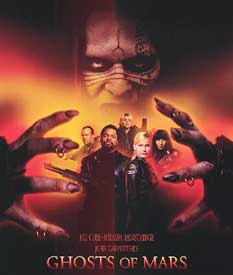 Ghosts of Mars (2001) shows an Earth settlement on Mars erupting in violence when ghosts of ancient Martian warriors begin possessing the settlers. A slick veneer hides its cheapness pretty well, but it nevertheless views mostly like a zombie flick set in a small western mining town & does a very poor job of looking like it takes place two centuries in the future let alone on Mars. Ghosts of Mars (2001) shows an Earth settlement on Mars erupting in violence when ghosts of ancient Martian warriors begin possessing the settlers. A slick veneer hides its cheapness pretty well, but it nevertheless views mostly like a zombie flick set in a small western mining town & does a very poor job of looking like it takes place two centuries in the future let alone on Mars.
Slightly offbeat casting (Natasha Henstridge, Ice Cube, Pam Grier) perks it up, & the action sequences, slow to arrive, provide plentiful gore. If no one had any expectations of John Carpenter, or if this exact same film had been the work of an as-yet unknown first-time filmmaker, it wouldn't be judged as harshly; it'd be ranked a decent full-blown exploitation actioner of absolutely no consequence.
I have often since thought of Prince of Darkness as the cut-off point for John Carpenter as a "promising to become great" director, for that promise seemed no longer at all likely. After Prince he got increasingly shitty.
Before that cut-up point, he'd done such great stuff either as Dark Star, Assault on Pricinct Thirteen, Christine, Starman, The Fog besides the influential Halloween & his script for The Eyes of Laura Mars (1978).
By contrast his post-Prince output included films that could've been the work of any competent uninteresting director, notoriously the sight-gag reliant & relentlessly assinine Memoirs of an Invisible Man (1992). Although I must admit I kinda admired Escape from L.A. (1996), it smacked of desparation to repeat the early success of Escape from New York (1981).
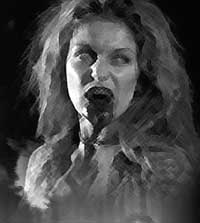 Vampires (1998) totally sucked & I don't mean just the victims' blood. Ghosts of Mars had some of the same more-action-than-content problems as Vampires but I liked it better because it did provide some before-the-action sequences for characters to develop. The nonstop gore effect of Vampires with no character development was too soon tiresome. Vampires (1998) totally sucked & I don't mean just the victims' blood. Ghosts of Mars had some of the same more-action-than-content problems as Vampires but I liked it better because it did provide some before-the-action sequences for characters to develop. The nonstop gore effect of Vampires with no character development was too soon tiresome.
James Woods (who was so great in Videodrome, 1983) is not at all controlled by the director & just runs all over the story like a screaming steamroller wrecking everything. Carpenter even let Woods make up his own dialog & everyone thought everyone was so bloody clever, but they were wrong. There were also moments I wished Sergio Leone was directing Vampires. It might've worked with someone actually at the helm.
You could get some good stills out of Vampires but you won't find a good movie. For viewers who really do prefer nonstop action with next to zero characterization getting in the way of the pacing, this may well be the one.
The only sequence that grabbed me was when one of the guys on the vampire hunter crew rigs up his truck to be a sunless cage in which he can keep his animalistic sweetheart alive rather than kill her, & makes a run for the border hoping now to use his vampire hunting skills to keep his girlfriend from ever being tracked down & killed by other vampire hunters. His devotion to her even though it was too late was very touching. I'd've much preferred to see a film about those two characters on the lam across Mexico.
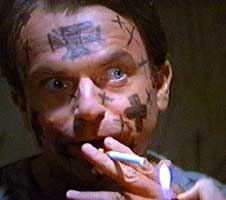 Not that everything was unmitigated crap. His first film after Prince of Darkness was They Live (1988), his best science fiction film. Not that everything was unmitigated crap. His first film after Prince of Darkness was They Live (1988), his best science fiction film.
They Live from a short story by Ray Nelson posits a dystopian future in which, if you had the right set of sunglasses, you could see the "real" world was black & white & money had nothing printed on it but the information "This is your god" while surrounded by a barrage of media messages like "Submit to authority." the human population is being constantly monitored by aliens who look just like humans -- unless you have those sunglasses. Visually & for story this was inventive stuff.
His "near-miss" In the Mouth of Madness (1994), an homage to HPLovecraft, was supposed to be his artful comeback, though to some degree it is a better-budgeted Prince of Darkness. It had great if few tentacle FX, some darkly aesthetic cinematography, perfectly reasonable acting headed up by Sam Neill plus an array of creditably hammy support roles.
But it was overall such an irrational mishmash story-wise. Then when it got to the main FX pay-off, it was kind of a corny doorway-to-hell schtick & captured nothing of the otherworldly lovecraftian realm (which, to be fair, is vague even in Lovecraft's stories, & was never meant to be as explicit as movie FX). Still, for a while I didn't believe Carpenter could do anything well since losing Deborah Hill for scripts, but with In the Mouth of Madness he proved he could put something together that was interesting without her, whether or not muddled.
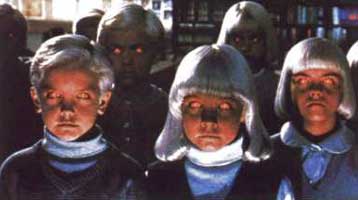 Village of the Damned (1995) about an alien invasion via the simultaneous pregnancy of all the women of a small village doesn't entirely fail -- unless you've seen Wolf Rilla's original 1960 version; then you'll inevitably compare how badly Carpenter trashed up a great story. Village of the Damned (1995) about an alien invasion via the simultaneous pregnancy of all the women of a small village doesn't entirely fail -- unless you've seen Wolf Rilla's original 1960 version; then you'll inevitably compare how badly Carpenter trashed up a great story.
Even so, Carpenter's version is well-cast & retains the visual assumption that "perfect" Aryans constitute evil. Works for me.
So that's three or at most four (counting Escape from L.A.) moderately good to very good films in the post-Prince of Darkness when the "odds" of a new Carpenter film being great dropped dramatically.
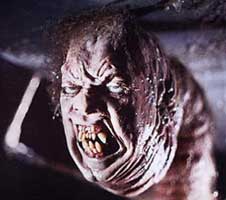 Some part of Carpenter's downfall as an artist can be detected pre-Prince but the percentage of good films was nevertheless higher way-back-then. Some part of Carpenter's downfall as an artist can be detected pre-Prince but the percentage of good films was nevertheless higher way-back-then.
The original The Thing (1951) was intensely suspenseful without need of special FX to evoke the paranoia of encountering a shape-shifting alien in Antarctica. John Carpenter's The Thing (1982) goes shitty-ass the opposite direction & has vastly more FX with very little suspense. "Oh looky at the dog sprout tentacles!" "Oh looky at the severed head grow spider legs!" It's like an unintentional parody of a science fiction film.
Yet some of my chums disagree with me & regard The Thing as a damned good film. I find it's all-special-effects all-the-time approach to be a bore, though not nearly as empty of character as Vampires would be some years later.
It had this stunning cast but it wanted its robotic transformation FX to be the stars instead. I saw it the first time as a new release in a big screen cinema, & regarded it a glossy failure. Recently however, half against my will, I watched this lame sci-fi adventure on the small screen, & it seemed a much better film. It lives up to small-screen expectations. The overdone FX are subdued when viewed small, & that means the small amount of time apportioned to actors acting seems larger.
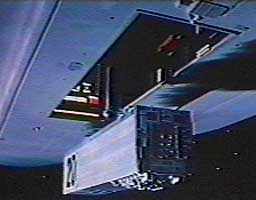 Assessing the best of his pre-Prince films is much more rewarding. Dark Star (1974) was such a beautifully done science fiction comedy. It's amazing to me that it holds up after so long. That bad-ass beachball monster; the philosophic bomb learning relativism while stuck in the bombay doors; the lost astronaut joining the phoenix asteroids; the whole purpose of their mission to seek out life on other worlds to destroy it...just an amazing film start to finish. Assessing the best of his pre-Prince films is much more rewarding. Dark Star (1974) was such a beautifully done science fiction comedy. It's amazing to me that it holds up after so long. That bad-ass beachball monster; the philosophic bomb learning relativism while stuck in the bombay doors; the lost astronaut joining the phoenix asteroids; the whole purpose of their mission to seek out life on other worlds to destroy it...just an amazing film start to finish.
Sometimes youthful genius really is the height of certain artists' brilliance, & the imposition of mature business decisions later in life will never permit such effective oddity to predominate. As the student film THX 1138 (1971) may well be the best George Lucas has or ever will do, Dark Star is a peak for its makers John Carpenter & Dan O'Bannon.
Carpenter wrote the script for the impressive supernatural thriller The Eyes of Laura Mars (1978). Faye Dunaway is Laura, who can see through the eyes of a killer. The theme has been recycled many times since, but the original is Carpenter's story.
The cast was probably not that well known at the time, but the excellence of the casting is proven by later fame: Tommy Lee Jones, Brad Dourif, Raul Julia & Rene Auberjonois. It made for one of the best thrillers of the '70s & the fact that it thinks about the theme of violence against women renders suprisingly contemporary rather than a relic of its decade.
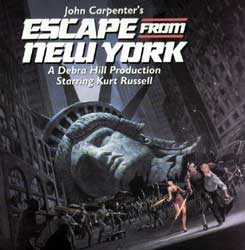 The original Assault on Precinct 13 (1976) shows that Carpenter could've gone another direction than horror. It's a police action fiction, extremely good of kind, & still one of Carpenter's best films. The original Assault on Precinct 13 (1976) shows that Carpenter could've gone another direction than horror. It's a police action fiction, extremely good of kind, & still one of Carpenter's best films.
Escape from New York is a good action sci-fi drama. Manhattan has become a place of exile for criminals, cut off from the outside world, but when someone gets trapped inside who shouldn't be there, they send in Snake (Kurt Russell) to bring her out. I loved this movie when it was brand new & I saw it in a drive-in; I've seen it a couple times since & it holds up damned well. It never weakens or ages too much for my liking, because I love Snake.
It's post-Prince sequel Escape from L.A. although incapable of being as original as the first time through, nevertheless one-ups the original with even odder characters & elaborate sequences in the walled prison colony that Los Angeles has been turned into. And it was great to be able to once more see Snake.
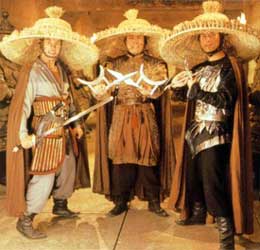 Big Trouble in Little Chinatown (1986) was a fun film, & too bad hardly anybody went to see it on release. It almost sank Carpenter's career as no one would give him a noticeable budget after this one bombed in the box office. Yet much as I hate to see a white guy starring in a Chinese adventure with Asian characters all relegated to support roles & villains, I do nevertheless invariably enjoy Kurt Russell. Big Trouble in Little Chinatown (1986) was a fun film, & too bad hardly anybody went to see it on release. It almost sank Carpenter's career as no one would give him a noticeable budget after this one bombed in the box office. Yet much as I hate to see a white guy starring in a Chinese adventure with Asian characters all relegated to support roles & villains, I do nevertheless invariably enjoy Kurt Russell.
Big Trouble is a lovely unserious film with more than a few exotic images & supernatural figures with great appeal. It's by no means a great film, more like a great comic book, but as whimsical entertainment & homage to Hong Kong fantasy, it more than succeeds. Love those flying sorcerers' hats!
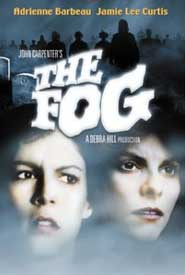 For a long time, The Fog (1980) was my favorite Carpenter film, & a great vehicle for Jamie Lee Curtis to prove her performance in Halloween was no mere fluke. Solid story, great female hero, elegant ghostliness, moody setting of oceanside village with lighthouse, & a musical score only slightly less stunning than for Halloween. For a long time, The Fog (1980) was my favorite Carpenter film, & a great vehicle for Jamie Lee Curtis to prove her performance in Halloween was no mere fluke. Solid story, great female hero, elegant ghostliness, moody setting of oceanside village with lighthouse, & a musical score only slightly less stunning than for Halloween.
Starman (1984), being a sentimental love story with Jeff Bridges from outer space, by rights should've been totally stinko. But great performances or something made it wonderful, & I loved it start to finish despite that such thick sentimentality usually causes my eyes to get stuck in the rolling upward position.
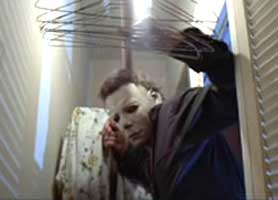 And of course John Carpenter's real beginning as a commercially viable horror film maker was Halloween (1978) which will always remain historically important. And of course John Carpenter's real beginning as a commercially viable horror film maker was Halloween (1978) which will always remain historically important.
Having Deborah Hill on board seems to have been the secret to its success, as it took the hoary slash-all-women theme & added the "novelty" of the last woman fighting back successfully. This simple innovation revolutionized slasher films which for the next couple decades always included one frigid woman who by avoiding having sex could use all that pent-up energy to fight her way out of the clutches of a psychopath.
Watching it anew not terribly long ago, it sort of surprised me how non-bloody it is, films having gotten so much more over-the-top in the intervening decades. But it remains good-of-kind even apart from its historical significance, & it's still just so obviously heads & tails above its predecessors. The "luck" of getting that creepily altered Captain Kirk mask, gads -- there might never have been a franchise without it. And Carpenter's simply wonderful score!
A lot came together without intent, but that can be said for the works of many an artist in many a medium. Sequels to Halloween are less significant & of very mixed quality from sundry other directors, but for as long as Donald Pleasance was alive, there was guaranteed to be at least one good support-performance for the mask.
copyright © by Paghat the Ratgirl
|
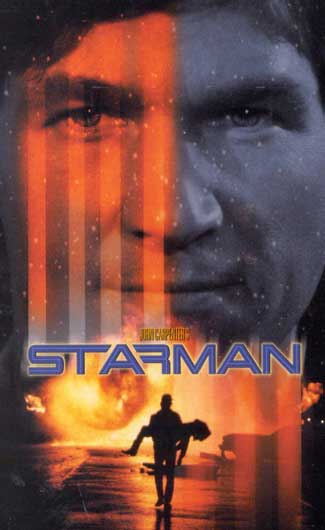
 Unfortunately I made the mistake of mentioning I'd just been to see a really bad, bad film, Prince of Darkness directed by John Carpenter.
Unfortunately I made the mistake of mentioning I'd just been to see a really bad, bad film, Prince of Darkness directed by John Carpenter. Ghosts of Mars (2001) shows an Earth settlement on Mars erupting in violence when ghosts of ancient Martian warriors begin possessing the settlers. A slick veneer hides its cheapness pretty well, but it nevertheless views mostly like a zombie flick set in a small western mining town & does a very poor job of looking like it takes place two centuries in the future let alone on Mars.
Ghosts of Mars (2001) shows an Earth settlement on Mars erupting in violence when ghosts of ancient Martian warriors begin possessing the settlers. A slick veneer hides its cheapness pretty well, but it nevertheless views mostly like a zombie flick set in a small western mining town & does a very poor job of looking like it takes place two centuries in the future let alone on Mars. Vampires (1998) totally sucked & I don't mean just the victims' blood. Ghosts of Mars had some of the same more-action-than-content problems as Vampires but I liked it better because it did provide some before-the-action sequences for characters to develop. The nonstop gore effect of Vampires with no character development was too soon tiresome.
Vampires (1998) totally sucked & I don't mean just the victims' blood. Ghosts of Mars had some of the same more-action-than-content problems as Vampires but I liked it better because it did provide some before-the-action sequences for characters to develop. The nonstop gore effect of Vampires with no character development was too soon tiresome.
 Village of the Damned (1995) about an alien invasion via the simultaneous pregnancy of all the women of a small village doesn't entirely fail -- unless you've seen Wolf Rilla's original 1960 version; then you'll inevitably compare how badly Carpenter trashed up a great story.
Village of the Damned (1995) about an alien invasion via the simultaneous pregnancy of all the women of a small village doesn't entirely fail -- unless you've seen Wolf Rilla's original 1960 version; then you'll inevitably compare how badly Carpenter trashed up a great story.


 Big Trouble in Little Chinatown (1986) was a fun film, & too bad hardly anybody went to see it on release. It almost sank Carpenter's career as no one would give him a noticeable budget after this one bombed in the box office. Yet much as I hate to see a white guy starring in a Chinese adventure with Asian characters all relegated to support roles & villains, I do nevertheless invariably enjoy Kurt Russell.
Big Trouble in Little Chinatown (1986) was a fun film, & too bad hardly anybody went to see it on release. It almost sank Carpenter's career as no one would give him a noticeable budget after this one bombed in the box office. Yet much as I hate to see a white guy starring in a Chinese adventure with Asian characters all relegated to support roles & villains, I do nevertheless invariably enjoy Kurt Russell.
